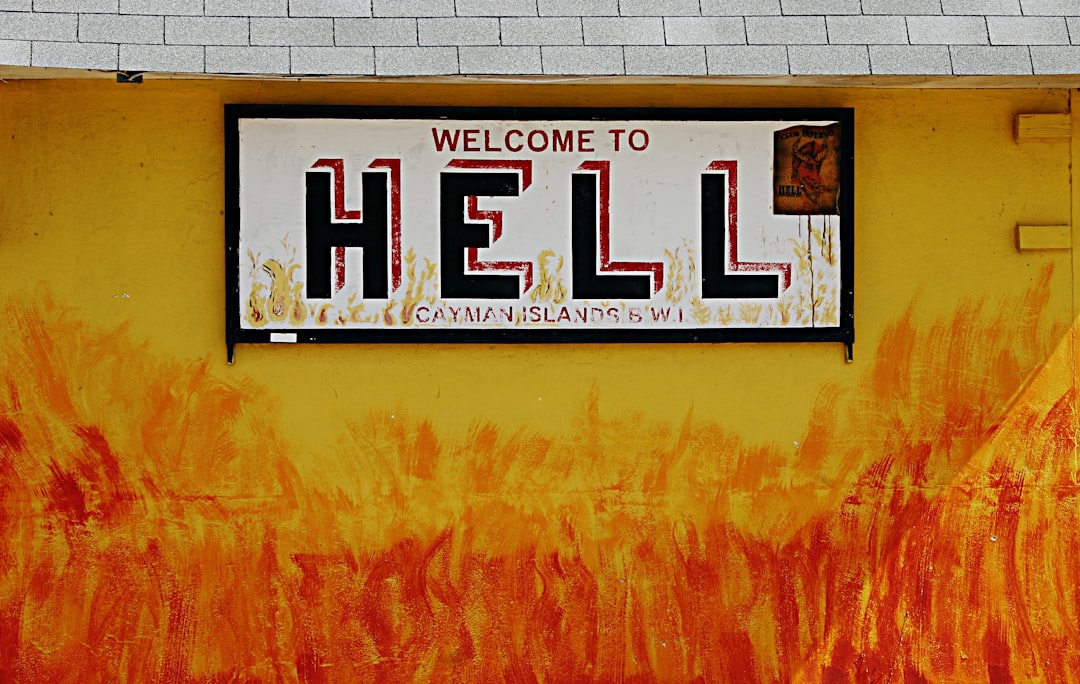Have you ever wondered whether God truly created Hell? This is a popular debate among scholars of theology, religion, philosophy, and even those who don’t believe in a higher power. In this article, we will explore various interpretations of Hell and the relationship between Hell and the creation. We will also examine the morality of Hell and the debate on whether it is a physical place or a symbolic concept. Keep reading to learn more about this fascinating topic.
The Various Interpretations of Hell in Theology

As a Christian, the concept of hell has been preached in many ways. This has led to various interpretations of its meaning and existence. Here are some of the most widely accepted interpretations of hell in Christian theology:
-
Eternal Damnation: This interpretation of hell asserts that those who have sinned without seeking redemption will spend eternity in damnation. This idea is supported by many biblical verses that mention “eternal punishment” and “unquenchable fire.”
-
Annihilationism: This belief suggests that hell is not a place of eternal punishment but rather a place where souls are annihilated or destroyed. This concept is supported by the idea that God’s love extends to all, even to those who have sinned.
-
Universalism: This is the idea that everyone, regardless of their sins, will eventually be saved. This belief is based on the concept that God’s love is all-encompassing and that he will eventually bring all souls to salvation.
-
Conditional Immortality: This interpretation suggests that eternal life is not an inherent quality of all souls. Instead, it is a gift that God gives to those who choose to follow his path. Those who do not choose to follow the path of righteousness will not be granted eternal life.
As you can see, there are different interpretations of hell in Christian theology. The debate on whether hell is real or symbolic continues to this day. Nevertheless, it is important to remember that the concept of hell serves a purpose in Christian theology. It reinforces the idea of the moral justice system and serves as a warning to those who choose to stray from the path of righteousness.

In the next section, we will explore how the belief in hell is related to the concept of divine creation. There is much debate on whether God created hell, and we will dive into this topic in detail.
The Relationship Between Hell and Divine Creation
As a Christian, the belief in hell and divine creation go hand-in-hand. In this section, we will explore the relationship between the two and how they intersect in theology.
Many Christians believe that God created hell as a place of eternal punishment for those who have sinned and rejected Him. This belief is rooted in Biblical teachings, with mentions of hell found in both the Old and New Testaments. Some Christians believe in a literal interpretation of hell as a fiery pit of eternal damnation, while others view it as a symbolic concept representing separation from God.
One aspect of the relationship between hell and divine creation that is often discussed is the nature of God’s judgment. According to Pauline theology, God is a just and righteous judge who holds all humans accountable for their sins. Hell, therefore, serves as a necessary part of the moral justice system in which those who have committed sins are punished for their wrongdoing.
The debate over whether hell is a literal place or a symbolic concept has significant implications for the role of human free will in the creation of hell. If hell is a literal place, then humans have the power to choose whether or not to end up there through their actions and beliefs. However, if hell is simply a symbolic concept, this suggests that God predetermined who would end up there and therefore challenges the notion of human free will.
Ultimately, the belief in hell and divine creation is a complex and often debated topic in theology, religion, and philosophy. It raises questions about morality, ethics, and the nature of the supernatural. Regardless of one’s personal beliefs, this topic remains an important part of many faith traditions and inspires robust discussion and debate within religious communities.
Pauline Theology on Hell and Creation
When it comes to the topic of Hell and Divine Creation, the Apostle Paul is one of the most influential figures in shaping Christian beliefs. Throughout his letters in the New Testament, Paul often references the concepts of eternal damnation, judgment, and salvation. In this section, we will explore the Pauline theology on Hell and Creation.
-
Hell as a consequence of sin: Paul argues that sin is the primary cause of human suffering and death. In Romans 6:23, he writes that “the wages of sin is death”, which alludes to the idea that sin leads to eternal separation from God. Moreover, he highlights that there will be a final judgment on the day of the Lord, where those who have committed sins will be punished with the second death (Revelation 20:12-15).
-
Creation as a reflection of God’s character: Paul sees the natural world as a testament to God’s power and glory. He writes in Romans 1:20, “For since the creation of the world God’s invisible qualities–his eternal power and divine nature–have been clearly seen, being understood from what has been made so that people are without excuse.” The purpose of creation, from Paul’s perspective, is to manifest God’s nature and to show his divine attributes.
-
The necessity of salvation through Jesus Christ: Paul stresses the importance of faith in Jesus Christ as the means of achieving salvation. He explains in Romans 10:9, “If you declare with your mouth, ‘Jesus is Lord,’ and believe in your heart that God raised him from the dead, you will be saved.” Through his teachings, Paul establishes that true salvation comes through believing in Jesus Christ and accepting him as the Lord and Savior.
In conclusion, Pauline theology on Hell and Creation provides a unique perspective on the role of sin and salvation in the Christian faith. For Paul, Hell is a consequence of sin, and creation reveals God’s divine nature. He emphasizes the importance of having faith in Jesus Christ as the path towards redemption and eternal life. Understanding Paul’s teachings can help Christians gain a deeper appreciation of their faith and live a more fulfilling life.
Hell as an Intricate Part of the Moral Justice System
Hell is one of the most complex and controversial topics in Christian theology. Some people believe in its literal existence as a place of eternal suffering for those who have committed sins, while others see it as a symbolic concept that represents the consequences of living a sinful life. Whatever the interpretation may be, one thing is certain: Hell is an intricate part of the moral justice system.

In Christianity, the belief in salvation and judgment is fundamental. The idea is that every person will be judged by God based on their actions while on earth, and this judgment will determine whether they spend eternity in heaven or in hell. The concept of hell serves as a warning and a deterrent against committing sinful acts, as the punishment is seen as eternal damnation.
According to Pauline theology, hell is not a place created by God as a punishment for sinners. Instead, it is a consequence of humans’ disobedience and rejection of God’s love and grace. This interpretation suggests that humans have the power to choose between good and evil, and their choices determine whether they end up in heaven or hell.
It is important to note that not all Christians believe in the literal existence of hell. Some see it as a metaphorical concept that represents the psychological and spiritual consequences of sin. They argue that hell is not a physical place, but rather a state of mind and soul caused by the separation from God.
The role of human free will in the creation of hell is a highly debated topic. Some believe that God created humans with the choice to obey or disobey Him, and thus the creation of hell was an inevitable consequence of free will. Others argue that God created humans with the intention of saving them, and the existence of hell is a result of human choices that reject God’s love.
In conclusion, the belief in hell is a crucial part of the Christian theology. Whether it is seen as a literal place or a symbolic concept, it represents the moral justice system that serves as a warning and a deterrent against committing sinful acts. The debate on its existence and interpretation will continue, but what is certain is that the belief in God and the afterlife is a fundamental aspect of faith for many Christians.
The Debate on Whether Hell is a Literal Place or a Symbolic Concept
« Exploring the Exclusive Christian Belief: Is Jesus the Only Way to Heaven?
Unraveling the Mystery of Cornelius in the Bible »
When it comes to the belief in Hell, there is much debate within the Christian community about whether it is a literal place or a symbolic concept. Here are a few points to consider:
-
Literal Interpretation: Many Christians believe that Hell is a real place of eternal punishment for those who reject God and choose to live a life of sin. This belief is based on biblical teachings and is backed up by several Bible passages that describe Hell as a place of fire, darkness, and eternal torment.
-
Symbolic Interpretation: Others argue that Hell is not a physical place but rather a metaphor for the consequences of living a life without God. This interpretation suggests that Hell is a state of being rather than a location, and that those who reject God will experience eternal separation from Him.
-
In-between Interpretation: Some Christians take a more nuanced approach, suggesting that Hell may be both a literal place and a symbolic concept. They believe that the physical nature of Hell is real, but that the symbolism of eternal punishment serves as a warning against the dangers of sin and living life apart from God.
Ultimately, the debate over whether Hell is a literal place or a symbolic concept is ongoing. Each interpretation has its merits, and individuals will arrive at their own conclusions based on their personal beliefs and understandings of scripture.
Regardless of whether one believes in a literal Hell or a symbolic one, the overarching message remains the same: to live a life of faith in God and to reject sin and temptation. Christians believe that choosing a life of sin will lead to eternal damnation, while choosing a life of faith will lead to eternal salvation. It is up to each individual to make that choice for themselves.
In conclusion, the debate on whether Hell is a literal place or a symbolic concept is one that will likely continue for years to come. Regardless of one’s personal beliefs on the matter, what matters most is living a life that is guided by faith, truth, and love.
The Role of Human Free Will in the Creation of Hell

The idea of eternal damnation in hell has been a source of controversy and debate for centuries among different religions and ideologies. Some argue that God created hell as a place of eternal punishment for those who commit sins, while others view it as a metaphorical concept without any basis in reality. However, regardless of one’s belief, the role of human free will in the creation of hell cannot be ignored.
In many religions, the concept of free will is central to understanding the relationship between God and humanity. Humans are believed to have the ability to choose between good and evil, and their choices determine their fate in the afterlife. In this context, the belief is that humans create their own hell by choosing to act in ways that separate them from God’s love and mercy.
For example, in Christianity, sin is considered to be the root of all evil, and it is believed that a person’s moral choices determine whether they will spend eternity in heaven or hell. Those who choose to accept Christ and live a life that is pleasing to God will be rewarded with salvation, while those who reject Christ and live in sin will face eternal damnation.
Similarly, in Islam, the concept of free will is emphasized, and it is believed that a person will be judged according to their deeds on the Day of Judgment. Those who have lived a life of righteousness will be rewarded with paradise, while those who have committed sins and failed to repent will be punished in hell.
The role of free will in the creation of hell raises important questions about the nature of God and his relationship with humanity. If God is all-knowing and all-powerful, why would he allow his creations to choose a path that leads to eternal damnation? Some argue that this is the result of God’s love and respect for human autonomy, while others see it as evidence that free will is an illusion and that humanity is merely playing out a predetermined script.

Regardless of one’s beliefs, it is clear that the concept of human free will plays a significant role in the creation of hell. It is a reminder that our choices have consequences and that we are responsible for our own moral destinies. It also highlights the importance of living a life that is guided by faith and a commitment to doing what is right, rather than simply following one’s own desires and impulses.












